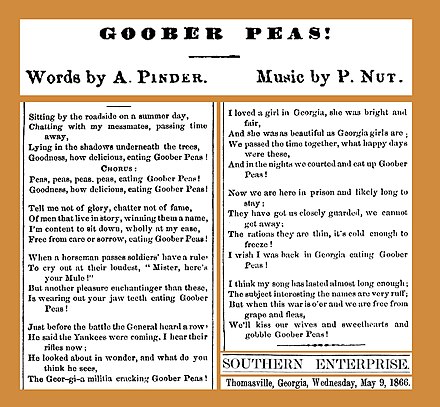| "Goober Peas" | |
|---|---|
 Cover, sheet music, 1866 Cover, sheet music, 1866 | |
| Song | |
| Language | English |
| Published | 1866 |
| Composer(s) | P. Nutt |
| Lyricist(s) | A. Pindar |
"Goober Peas" (pronunciation) is a traditional folk song probably originating in the Southern United States. It was popular with Confederate soldiers during the American Civil War, and is still sung frequently in the South to this day. It has been recorded and sung by scores of artists, including Burl Ives, Tennessee Ernie Ford, Rusty Draper and The Kingston Trio.
The lyrics of "Goober Peas" are a description of daily life during the latter part of the Civil War for Southerners. After being cut off from the rail lines and their farm land, they had little to eat aside from boiled peanuts (or "goober peas") which often served as an emergency ration. Peanuts were also known as pindars and goobers.
Publication date on the earliest sheet music is 1866, published by A. E. Blackmar in New Orleans. Blackmar humorously lists A. Pindar as the lyricist and P. Nutt as the composer.
Lyrics

Verse 1
- Sitting by the roadside on a summer's day
- Chatting with my mess-mates, passing time away
- Lying in the shadows underneath the trees
- Goodness, how delicious, eating goober peas.
- Chorus
- Peas, peas, peas, peas
- Eating goober peas
- Goodness, how delicious,
- Eating goober peas.
Verse 2
- When a horse-man passes, the soldiers have a rule
- To cry out their loudest, "Mister, here's your mule!"
- But another custom, enchanting-er than these
- Is wearing out your grinders, eating goober peas.
- Chorus
Verse 3
- Just before the battle, the General hears a row
- He says "The Yanks are coming, I hear their rifles now."
- He turns around in wonder, and what d'ya think he sees?
- The 15th Alabama, eating goober peas.
- Chorus
- (Note: There sat the 15th Alabama, is reported in contemporary accounts)
Verse 4
- I think my song has lasted almost long enough.
- The subject's interesting, but the rhymes are mighty tough.
- I wish the war was over, so free from rags and fleas
- We'd kiss our wives and sweethearts, and gobble goober peas.
- Chorus

Problems playing this file? See media help.
Additional verse
The Reverend Wayland Fuller Dunaway recorded a stanza of the song he heard while imprisoned at the Union prison on Johnson's Island, Ohio, during the latter part of the Civil War. Dunaway had been a captain in Co. I, 40th Virginia Infantry, when captured during the Battle of Falling Waters in July 1863. His stanza:
- But now we are in prison and likely long to stay,
- The Yankees they are guarding us, no hope to get away;
- Our rations they are scanty, 'tis cold enough to freeze,—
- I wish I was in Georgia, eating goober peas.
- Peas, peas, peas, peas,
- Eating goober peas;
- I wish I was in Georgia, eating goober peas.
- —Stanza of a Prison Song.
In popular culture
- In Veep Season 3 Episode 3 "Alicia", Mike is made to kneel and sing "Goober Peas" by Jonah in order to not publish a compromising story.
- In the Parks & Recreation Season 5 episode titled "Article Two," Patton Oswalt plays Garth Blundin, who challenges Leslie Knope to compete in a 1800s “roughing it” competition, at one point running through the background playing with a hoop-and-stick and singing “Goober Peas.”
References
- ^ Domonoske, Camila (April 20, 2014). "A Legume With Many Names: The Story Of 'Goober'". NPR.org. National Public Radio. Archived from the original on June 6, 2020.
- "Goober Peas!". Southern Enterprise. Thomasville, Georgia, U.S. May 9, 1866. p. 2.
- Dunaway, Reminiscences of a Rebel, p. 190.
- Martin, Denise (22 April 2014). "Veep's Timothy Simons on Jonah's Near Victory, 'Goober Peas,' and Letterman-Induced Stress Dreams". Vulture. Retrieved 24 April 2019.
Bibliography
- Dunaway, Wayland Fuller. Reminiscences of a Rebel. New York: The Neale Publishing Company (1913).
- Pindar, A., Esq. (w.); Nutt, P., Esq. (m.). "Goober Peas" (sheet music). New Orleans : A.E. Blackmar (1866).